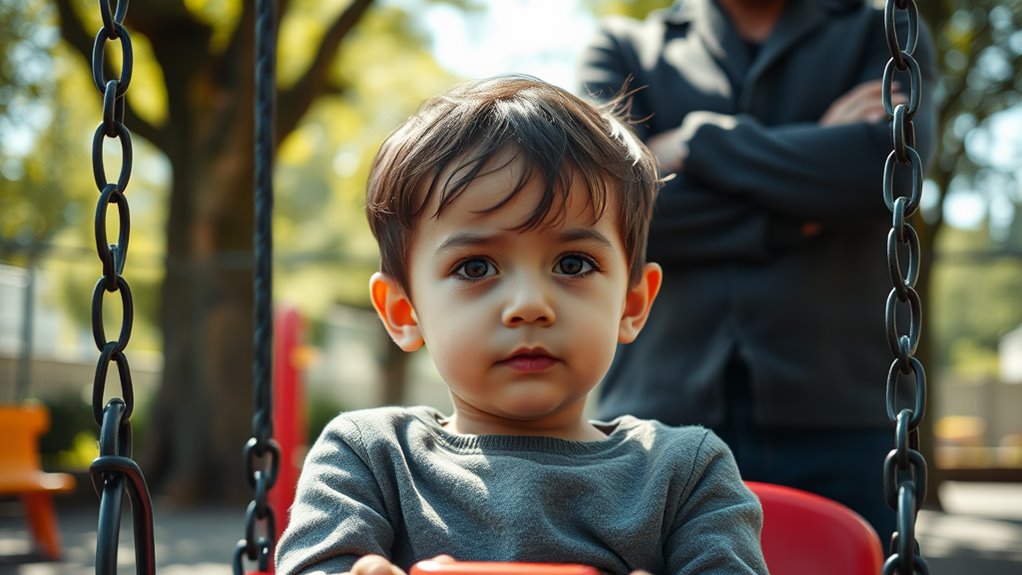Why Co-Parenting Works- The Science Behind Shared Parenting
Co-parenting works because it fosters a collaborative environment that benefits everyone involved. When you share parenting responsibilities, it reduces stress and enhances communication between you and your ex-partner. This teamwork not only models effective communication for your children, but also cultivates emotional resilience in them. Kids thrive when they see consistent involvement from both parents, which helps them learn conflict resolution and develop emotional intelligence. Plus, a strong co-parenting relationship promotes a sense of unity and stability that positively impacts your children’s future. There’s so much more to explore about its benefits and science behind it.
Key Takeaways
- Shared parenting fosters collaboration, enhancing family dynamics and promoting unity between parents for a healthier family environment.
- Children benefit from emotional resilience and secure attachments through consistent communication and nurturing from both parents.
- Involvement from both parents reduces anxiety in children and teaches essential conflict resolution and emotional intelligence skills.
- Strong communication strategies between ex-partners minimize misunderstandings and foster a cooperative atmosphere for effective co-parenting.
- Long-term commitment to co-parenting leads to improved emotional stability, academic performance, and social skills in children, setting them up for future success.
Benefits of Shared Parenting
Have you ever wondered how shared parenting can transform your family dynamics? By embracing shared responsibility, you’re not just splitting chores or time; you’re fostering a collaborative environment that benefits everyone involved.
When both parents actively participate in raising the children, it creates a sense of unity and teamwork. This is crucial for establishing a nurturing atmosphere where kids can thrive.
One of the most significant advantages of shared parenting is improved communication. Since both parents are engaged in decision-making, you’re likely to discuss parenting strategies and approaches more openly.
This dialogue can lead to better understanding and alignment on important issues, such as discipline and education. As you work together, you’ll also model effective communication skills for your children, teaching them how to resolve conflicts and express their feelings.
Additionally, shared parenting can help reduce stress for both parents. When responsibilities are evenly distributed, you’ll find it easier to manage your time and energy.
This balance not only enhances your well-being but also leads to a more positive family dynamic. Ultimately, shared parenting lays the groundwork for a supportive and loving environment that nurtures both you and your children.
Emotional Development in Children
Emotional development in children is a crucial aspect of their overall growth and well-being. When co-parenting, you create a nurturing environment that can significantly influence your child’s emotional resilience. By maintaining consistent communication and support, you help your child form secure attachment styles, which are vital for healthy relationships and emotional health.
In a co-parenting setup, children benefit from observing different emotional responses and coping strategies. This exposure allows them to learn how to express their emotions and navigate challenges more effectively. You and your co-parent can model positive interactions, demonstrating empathy and conflict resolution.
These experiences contribute to building emotional resilience in your child, enabling them to bounce back from setbacks and adapt to changes.
Moreover, when both parents are involved, it fosters a sense of security and stability. Children are more likely to develop a positive self-image and understand their emotions better.
Impact on Children’s Behavior
The way children behave is often a reflection of their emotional development and the environment in which they’re raised. When you and your co-parent work together, it creates a stable atmosphere that encourages positive behavioral adjustments.
Children learn how to navigate their feelings and social interactions by observing your cooperation and commitment to their well-being.
Here are some ways shared parenting impacts children’s behavior:
-
Emotional Security: Knowing that both parents are involved helps kids feel secure, reducing anxiety and improving their behavior.
-
Conflict Resolution Skills: By witnessing healthy communication and problem-solving between you and your co-parent, children learn to handle conflicts effectively in their own relationships.
-
Adaptability: Co-parenting can teach kids how to adapt to different environments and schedules, enhancing their resilience and flexibility.
Ultimately, a consistent and collaborative parenting approach fosters emotional intelligence in children.
They not only learn how to express themselves but also how to engage with others constructively. This foundation can lead to healthier relationships as they grow, making co-parenting a powerful tool for shaping positive behavior.
Strengthening Ex-Partner Relationships
Navigating co-parenting often requires you to strengthen your relationship with your ex-partner, especially when it comes to communicating effectively for your children’s sake.
Establishing clear communication strategies can help you both stay on the same page, reducing misunderstandings and fostering a more cooperative atmosphere. Consider setting regular check-ins to discuss important matters, ensuring you both feel heard and valued.
Conflict resolution is another critical aspect of strengthening your relationship. It’s natural for disagreements to arise, but how you handle them makes all the difference.
Approach conflicts with a problem-solving mindset rather than a confrontational one. Use “I” statements to express your feelings without placing blame, and listen actively to your ex-partner’s perspective.
Long-Term Outcomes of Co-Parenting
Co-parenting can shape your children’s future in profound ways. When you and your ex-partner prioritize shared responsibilities, you’re not just co-parenting; you’re fostering a healthier environment for your kids.
Research shows that effective co-parenting dynamics lead to numerous long-term benefits, including:
- Emotional stability: Children tend to exhibit lower levels of anxiety and depression.
- Better academic performance: Consistent support from both parents often translates into improved focus and grades.
- Stronger social skills: Kids learn to communicate and resolve conflicts effectively from seeing their parents work together.
By maintaining a supportive relationship, you’re giving your children the tools they need to navigate their own relationships in the future.
The way you handle disagreements and collaborate on parenting decisions provides a model for your kids. They’ll likely carry those lessons into adulthood, creating healthier bonds and partnerships of their own.
Ultimately, your commitment to co-parenting not only benefits your children today but also sets them up for a brighter tomorrow.
Embrace the journey of shared parenting; it’s one of the greatest gifts you can offer your kids.
Frequently Asked Questions
How Can Co-Parenting Affect a Child’s Academic Performance?
Co-parenting’s like a well-tuned orchestra; it fosters emotional stability, boosting your child’s academic motivation. When you and your partner harmonize, your child’s focus sharpens, and their performance can soar in school.
What Role Does Communication Play in Successful Co-Parenting?
Communication’s key in successful co-parenting. When you engage in effective dialogue and practice emotional intelligence, you foster a cooperative environment. This not only benefits your relationship but also positively impacts your child’s well-being and development.
Are There Specific Co-Parenting Strategies That Work Best?
For effective co-parenting, consider establishing clear parenting agreements and identifying co-parenting styles that suit both of you. Consistency in routines and open communication can help create a supportive environment for your child’s development.
How Can Parents Handle Conflicts During Co-Parenting?
When navigating co-parenting conflicts, channel your inner Zen master. Use emotional intelligence to understand each other’s feelings, and practice conflict resolution like a pro. It’s not a competition—remember, you’re both on the same team!
What Resources Are Available for Co-Parents Seeking Support?
If you’re seeking support as a co-parent, consider attending co-parenting workshops or joining online forums. These resources provide valuable insights, shared experiences, and advice from others navigating similar challenges, making your journey easier and more manageable.





